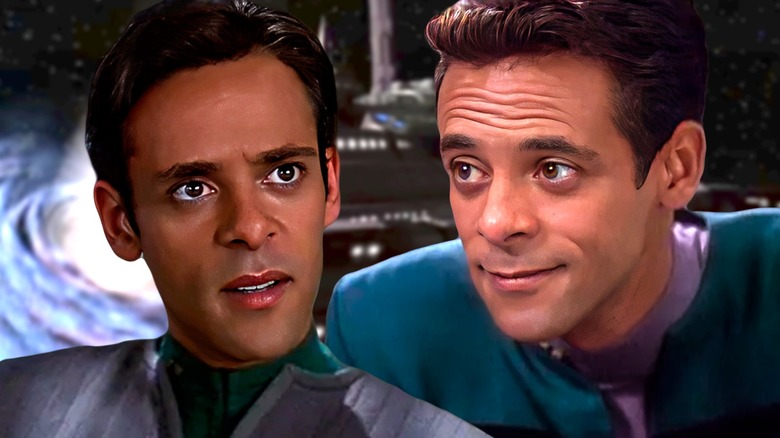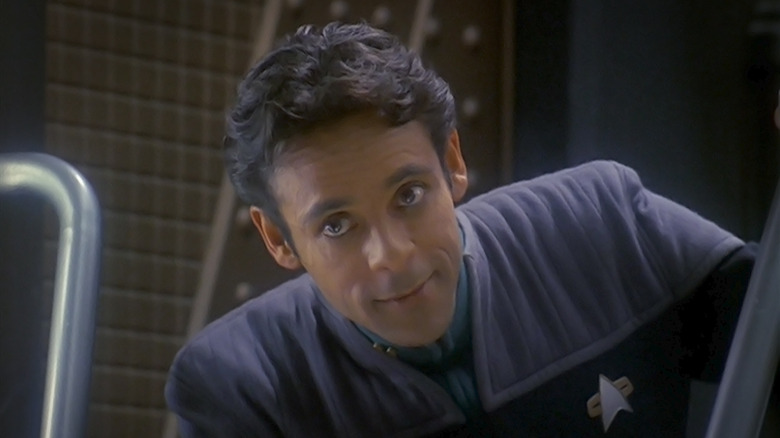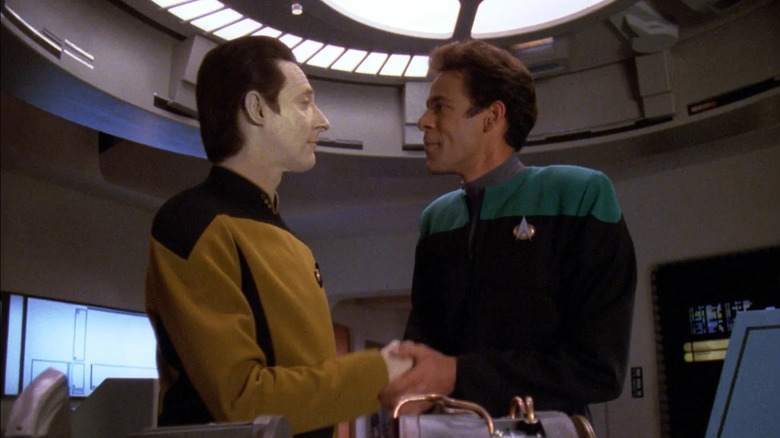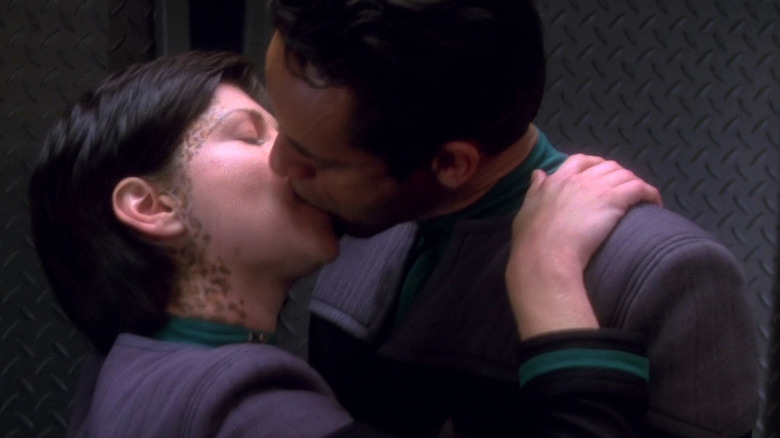How Star Trek: Deep Space Nine Bucked Franchise Norms With Dr. Bashir
Each "Star Trek" show is, despite its tendency to focus on starship and space station captains, an ensemble drama. Each series (the first two seasons of "Picard" notwithstanding) is about the workplace dynamic on board a space vessel, with characters of different backgrounds and personalities working together to solve crises. The characters may occasionally butt heads, but "Star Trek" creator Gene Roddenberry (in)famously discouraged that sort of conflict, preferring to depict a future where everyone got along, or at least treated each other with professional respect.
The group dynamic of "Star Trek," however, occasionally led to a perhaps-unconscious reliance on certain archetypes. Each Trek show, for the most part, features Stalwart Captain, Approachable Guy, Sensitive Soul, Culture Shock Alien, The Muscle, The Broody Outsider, Impatient Weirdo, Nerdy Tech-Head, and Inexperienced Noob. These broad "types" could alternately be combined into a single character or spread among many, but one can extrapolate them onto just about any Trek cast (again, "Picard" notwithstanding).
Many Trek shows featured characters whose primary feature was that they were young and inexperienced. Wesley Crusher (Wil Wheaton) on "Star Trek: The Next Generation" was merely a teenager, eager to join Starfleet. Jake Sisko (Cirroc Lofton) on "Deep Space Nine" had no such Starfleet ambitions, but was defined by his role as the captain's teenage son. On "Voyager," there was the beleaguered Harry Kim (Garrett Wang), a character who remained the "green ensign" for seven bloody years. On "Enterprise," Hoshi Sato (Linda Park) and Travis Mayweather (Anthony Montgomery) are defined by their youth.
It was Dr. Bashir (Alexander Siddig) on "Deep Space Nine" who bucked the trend.
Our man Bashir
The trend of youthful, inexperienced characters has continued apace in newer "Star Trek" shows, of course. On "Discovery," the young Adira (Blu Del Barrio) joins the crew to ... be a kid. Earlier in the series, Cadet Tilly (Mary Wiseman) had nothing going for her beyond her age and her awkwardness. Of course, all of the central characters in both "Lower Decks" and "Prodigy" are ensigns or teens. Even Uhura (Celia Rose Gooding) is a mere cadet in "Strange New Worlds." This is a trope that is not going away.
With Bashir, however, it was finally handled correctly. Bashir, unlike his counterparts, was allowed to grow up as time passed. Not that the other characters didn't grow, but Bashir matured. He mellowed out. He became an adult. One can only be young for so long.
The premise of "Deep Space Nine" was unique for "Star Trek." The series was set on a space station that had just been abandoned by the Cardassians, a Nazi-like military species that had been violently occupying the planet Bajor for years. After their withdrawal, Bajor inherited the station and had to undergo a lengthy restoration process to recover from the occupation. Although Bajor was not a member of the Federation, Starfleet officers were transferred to DS9 to aid in the restoration efforts, overseeing a planet that, thanks to a power vacuum, teeters on a becoming a corrupt theocracy. There was no trekking on "Deep Space Nine." Just political strife.
Dr. Bashir, a young Starfleet doctor, understood that DS9 would be a dangerous assignment, but was smiling and eager to engage in what he insultingly nicknamed "frontier medicine." Dr. Bashir was too chipper and too idealistic for the actual violence he would eventually face.
The youth grows up
Additionally, Bashir was, in the first few seasons of "Deep Space Nine," an insufferable flirt. He announced early on that he had a powerful attraction to Jadzia Dax (Terry Farrell), who had to bear the brunt of his date propositions and awkward come-ons. Alexander Siddig is a handsome man, and Bashir wore the confidence of a man who knew he was attractive. He was eager to please, professionally upbeat, and always trying to prove himself — the hallmarks of someone starting a job for the first time. Audiences learned later that he had parents who pushed him to overachieve.
If "Deep Space Nine" was to follow the pattern of its immediate predecessor, "Star Trek: The Next Generation," then it could conceivably be on the air for seven seasons. That means the young neophyte Bashir could be seven years older by the end. And a lot can happen in seven years. Indeed, on "Deep Space Nine," a lot can happen by a factor of 50; it was an incredibly eventful show. The series did end up running for seven seasons from 1993 to 1999, and in that time, Bashir grew up tremendously.
For one, Bashir's idealism was constantly challenged. When it came to his "frontier medicine" attitude, the embittered Bajoran, Major Kira (Nana Visitor), quickly schooled him on how insulting it was that Bashir considered her home planet's strife to be mere fodder for his adventure.
Dax, meanwhile, constantly rebuffed his advances. Dax is a Trill, a species that physically bonds with long-lived, surgically implanted symbiotes in their stomachs. The symbiote carries the memories of all its old hosts and blends personalities with whoever it occupies. The Dax symbiote is working on its seventh lifetime.
Being taught a lesson
Dax, as a result, had no patience for a young buck like Bashir, seeing through his flirty B.S. pretty quickly. Bashir's crush on Dax would eventually wane, as the good doctor came to regard her as a friend and a co-worker. The crush would, however, pay off in the show's seventh season, when Dax was killed and the symbiote was transferred into a character named Ezri (Nicole de Boer). Bashir and Ezri ended up falling in love.
As for Bashir's idealism, it would be constantly challenged by the slithery Garak (Andrew Robinson), a tailor and former spy who grinned while he lied. Bashir was fascinated by Garak and his loose interpretation of the truth, and the two formed a fast friendship that many fans consider a low-key romance. It was through Garak that Bashir learned there were no clear-cut answers, and that the idealism of Starfleet didn't always function during turbulent times. Bashir still had principles, but he increasingly understood that those principles were rarely shared.
And then there was a late-series twist that revealed that Bashir was illegally genetically manipulated by his parents while in utero. He is long-lived, extraordinarily intelligent, and has to hide the fact that he is physically fit beyond ordinary human standards. This twist, when revealed, showed that Bashir was posturing for his early career, putting on airs to hide his unfair genetic advantages.
Bashir was set up as a greenhorn, and presumably his youth was meant to carry his character through. The writers of "Deep Space Nine" acknowledged, however, that youth is not a permanent state, and that growth would be required. Bashir grew extraordinarily.
Let's hope the "Prodigy" kids can similarly grow up. And someone give Harry Kim a promotion, please.



